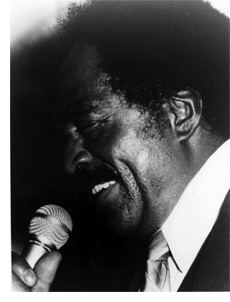Jimmy Witherspoon profile |
| Back
to the Books and Other Writing page Back to the Archive Contents page When I called Jimmy Witherspoon for this interview, he did not sound cheerful. "You gonna write what I say?" he asked. I said yes, I would. He said, "I've done a lot of these, and people always mess them up." I said I was recording the interview. He said, "You know that doesn't matter -- people say they're recording, and then they write whatever they want." To be honest, I generally messed with interview material -- I tried not to mess it up, but I changed some wording and moved sentences around so it flowed more smoothly -- but this one I did straight, because he told me to. JIMMY WITHERSPOON: IT'S ABOUT CLASS Wednesday through Saturday, Cambridge's Nightstage is hosting a historic musical event -- a reunion of jazz giants Jay McShann and Jimmy Witherspoon. ''It'll be a ball," Witherspoon says, speaking by phone from his L.A. home. "I started with Jay McShann. That was the first job I ever had. It's the first time we'll be working together in about 35, 38 years, other than one time in Europe. It'll be like a vacation, it won't be a job." Witherspoon, best known as a blues singer, considers the label too confining. "I'm doing American music," he says. "I sing anything. 'Blues singer' is a thing that a lot of American writers have put on singers who it hurts, at a Madison Avenue level. Where they'll bring in a white artist who tries to sing the blues and they'll spend four or five hundred thousand dollars on this artist, and they won't spend it on a black artist. "Take Mick Jagger, for instance. They'll spend all that money on him and he'll go in the studio and stay a year. He can't even sing in time, hear what I'm saying? But you take me. I've been nominated for two Grammys since I beat cancer of the throat -- I can sing better sick than Jagger can well. It's a shame. ''There's no difference in black music than there was in '38 or '40, it's still a fifth grade art, and that's sad. They know blues is important, but they don't want to pay the artist the money. I play in the top places in the world. I just played at Monte Carlo and was with Prince Rainier and the newspaper there said 'He was regal.' Regal. That is the ultimate. But I've never had that said to me in America." Nonetheless, Witherspoon is quick to correct any idea that he had to go to Europe to find acclaim. "My biggest triumphs have been in America. You get a few black artists who went to Europe who couldn't work in white clubs here, but I could work in any of them. I could work jazz festivals where B.B. King, Memphis Slim, none of them could work, including Joe Turner, who is my idol." Asked what it was that made it possible for him to get his wide range of work, he says, "Class—simple as that. Class, which comes from the womb, from the way your parents raised you. It comes from your environment, being with top musicians who have class, like Ben Webster, Jay McShann, Coleman Hawkins, Dizzy Gillespie, Miles Davis. That's all it is. And also knowing that musicians are 99 percent of any singer. Where a lot of singers think that they are greater than any musician, they are fools." Witherspoon came to prominence in the '40s, but he has not let his music stay there. "You have to move with the times," he says. "I surround myself with young people. Ben Webster taught me that also. He said if somebody came up at the same time you came up and they can't sing or play, give 'em a piece of money, don't work with 'em. Don't bring your own art down." Witherspoon has experimented with a wide range of styles over the years. His latest record, "Midnight Lady Called the Blues," which is currently up for a Grammy in the jazz vocal category, is in a classic jazz/R&B bag. Written by Dr. John and Doc Pomus and featuring such musicians as Dr. John, David (Fathead) Newman and Hank Crawford, it shows him at his best, his strong, shouter's voice soaring over the solid back-up. Witherspoon says that his 1981 bout with cancer has only made him stronger. ''I don't say I'm singing better, but I'm singing with more feeling than I ever did. A rabbi came up to me at the Blue Note in New York and asked me what was it that I was doing with the audience. It's nothing but a spiritual feeling." Asked if he would like to say anything to get people to come down and hear him, Witherspoon demurs. "Just tell them who I am, that's all. Let them be the judge. I don't want to build myself up. Just let them see, whether they're young or old. And be sure you mention Lennie's-on-the-Turnpike. He introduced me to Boston. He did so much for blues and jazz and too many people forget." |
 By Elijah Wald © 1987 (originally published in the Boston Globe)
By Elijah Wald © 1987 (originally published in the Boston Globe)